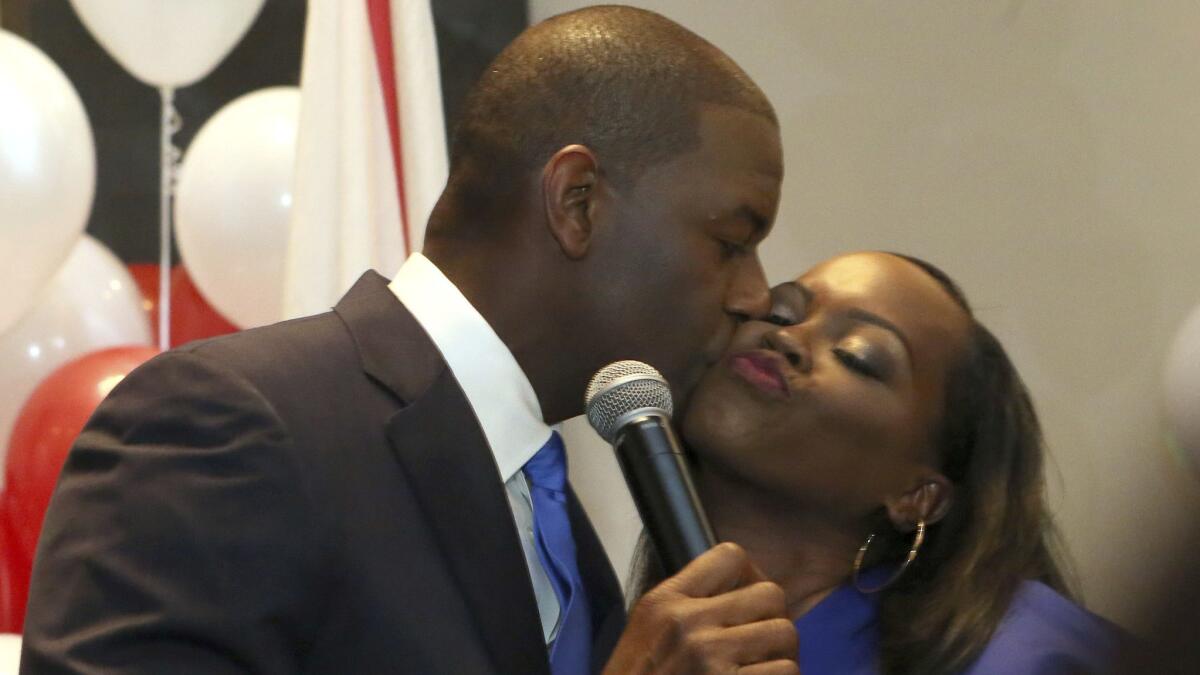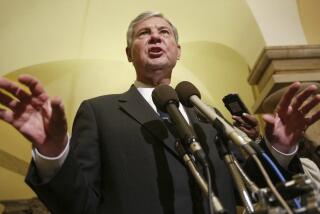Battle for Florida governor quickly becomes a test: Can a liberal, black Democrat win the nation’s biggest swing state?

Reporting from Atlanta — When Andrew Gillum stepped up to accept the Democratic nomination for Florida governor, he went back to the beginning — back to his working-class roots, back to the lesson he learned at an early age from his grandmother.
“She would say, ‘Bring it home,’” he said. “‘Baby, it ain’t just about you.’ ... There was a belief that if I went far in life, we would all go far in life, that if I did good, we would all do good. Well, Florida, y’all know what? We’ve got to bring that sense of community, collection and collectivism back to the state of Florida.”
Gillum’s upset victory in Tuesday’s primary made the 39-year-old Tallahassee mayor the first African American to win a major party nomination for Florida governor.
The win immediately set up Gillum as a national champion of the Democratic left and will almost surely turn the contest for governor in the nation’s largest swing state into one of the most intensely watched elections of the year — a test for the party’s progressive wing and for racial politics in the Trump era.
Gillum, a strongly liberal candidate who comes endorsed by Sen. Bernie Sanders (I-Vt.), now confronts Rep. Ron DeSantis, a staunchly conservative Iraq War veteran and Fox News commentator who wooed the Republican base — and the president — by presenting himself as a Trump loyalist.
Looming over the contest is the question of whether a black, left-of-center Democrat can win Florida. Within hours of the last primary votes being counted, the fraught issue of race had already taken center stage.
During the campaign, Gillum stood on a platform of Medicare for all, a $15-an-hour minimum wage, abolishing the Immigration and Customs Enforcement agency, standing up against the National Rifle Assn., and repealing Florida’s so-called stand-your-ground law — which justifies a person’s use of lethal force in certain cases.
DeSantis quickly went on the offensive, presenting his rival as a far-left socialist who would cripple the state’s economy and usher in an apocalyptic era of high crime.
“I’m trying to make Florida even better; he wants to make Florida Venezuela,” DeSantis said in a postelection interview with Laura Ingraham on Fox News. “This guy can’t even run the city of Tallahassee. There’s no way Florida voters can entrust him with our entire state.”
But it was another remark Wednesday morning on Fox that generated the most attention: DeSantis warned Floridians not to “monkey this up” by choosing Gillum, drawing protests from Democrats, who accused him of using a racially charged phrase.
“It’s disgusting that Ron DeSantis is launching his general election campaign with racist dog whistles,” Florida Democratic Party Chairwoman Terrie Rizzo said in a statement.
A spokesman for DeSantis said it was “absurd” to say the candidate’s comment was racial in nature.
He was “obviously talking about Florida not making the wrong decision to embrace the socialist policies that Andrew Gillum espouses,” said the spokesman, Stephen Lawson.
Democrats, however, were not about to let the issue drop. Gillum, also doing an interview on Fox, said DeSantis was mimicking Trump.
“In the handbook of Donald Trump they no longer do whistle calls — they’re now using full bullhorns,” he said, adding that voters are “sick of it.”
Gillum has played down the significance of his skin color, emphasizing that his campaign was geared toward all voters.
Asked in a postelection interview by CNN’s Don Lemon about vying to be the state’s first black governor, Gillum responded, “I’m vying to be the next governor of the state of Florida. I just so happen to be black.”
Born in Richmond Heights, a blue-collar community about 15 miles southwest of downtown Miami, Gillum has made much of his origins, branding himself during the primary as “the only non-millionaire in the race.”
His mother, Frances, was a bus driver who pressed clothes in a dry cleaning shop in the summer. His father, Charles, was a construction worker who took on side jobs selling fruit and vegetables on a street corner.
Gillum was the first of seven siblings to graduate from high school and college; at 23, he became the youngest city commissioner in the history of Tallahassee. At 35, he was elected mayor.
Throughout the primary, the conventional wisdom was that Gillum was a longshot. Critics noted that Tallahassee has the highest crime rate in the state. Its city hall is the subject of an FBI investigation into corruption. Gillum counters that he is not the target of the inquiry and has emphasized Tallahassee’s progress in having the fastest-growing economy in the state per capita and its tripling of solar energy production.
Although vastly outspent by his rivals, Gillum was boosted in late June when Tom Steyer, the billionaire Democratic donor from Silicon Valley, announced that his NextGen America organization would commit $1 million to Gillum’s campaign. In the final week of the race, Steyer, fellow billionaire George Soros and anonymous donors offered a last-minute boost of $650,000.
Even as Gillum gained in late polls, his rivals largely attacked one another, giving him a clear path in a multi-candidate field.
“Gillum was flying a campaign under the radar,” said Michael McDonald, associate professor of political science at the University of Florida.
Gillum ended surging ahead of four wealthy challengers, beating the more moderate establishment favorite, Gwen Graham, a former member of Congress and daughter of a former Florida governor and U.S. senator, by 34% to 31%.
Although Florida has famously been one of the country’s most evenly divided states in presidential elections, a Democrat has not won its governorship in more than 20 years. Some party strategists — and many Republicans — believe Gillum is too far to the left to break that streak.
Others, however, note that the strategy of nominating a moderate, white politician has failed repeatedly for Democrats in the state. Gillum’s victory in the primary showed he has an ability to inspire young and minority voters to the polls.
“What you saw in Gillum’s win is the changing of the guard generationally in Florida, a pattern you’re seeing across the country,” said Susan MacManus, a political analyst and professor emeritus of political science at the University of South Florida.
While Florida is often seen as a state of aging retirees, MacManus noted that about half of Florida’s current registered voters are in the three youngest generations — Gen Xers, millennials and now Generation Z. Among Florida Democrats, the majority of registered voters are nonwhite.
Gillum’s victory echoes what happened next door in Georgia in May, when Stacey Abrams became the first black female candidate to win the Democratic nomination for governor. Yet, unlike Georgia, which is a predominantly black-white state, Florida’s minority composition is far more diverse, with greater numbers of Latino, Asian and Caribbean blacks, as well as African American voters.
“He kind of fits an Obama mold,” McDonald said of Gillum. “Obama hit the stage as a relatively unknown candidate, but was able to excite the progressive side of the Democratic Party. That’s what the mold is for him.”
While much has been made of his endorsement from Sanders, Gillum has pitched himself as someone who can unite all wings of the Democratic Party. He is quick to note he was a committed supporter of Hillary Clinton during the 2016 campaign.
“Our candidacy has the ability to bring together the Hillary wing, the Barack Obama wing, the Bernie Sanders wing,” he told Lemon on CNN.
“Honestly, if we’re going to win in November, we have to have a candidate that can bring those folks together and [bring] some disaffected Republicans right along with us. But the way we’re going to do it is not by capitulating and shrinking from what we believe, but by giving our voters a reason to go out and vote for something.”
@jennyjarvie
UPDATES:
3:05 p.m.: This article was updated with a comment by DeSantis’ spokesman and a further comment by Gillum.
This article was originally published at 12:30 p.m.
More to Read
Get the L.A. Times Politics newsletter
Deeply reported insights into legislation, politics and policy from Sacramento, Washington and beyond. In your inbox three times per week.
You may occasionally receive promotional content from the Los Angeles Times.











